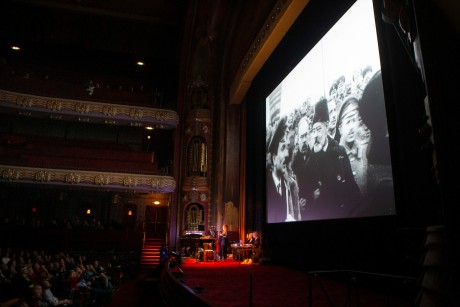


Dziga Vertov: Anniversary of the Revolution

Tuesday night I was back in Saint Petersburg after two days at the IDFA festival in Amsterdam. In the cinema. On screen. No, wrong – I was back in Petrograd 1918 through the outstanding film historical event organized so brilliantly by the festival. A full house in the Tuschinski for a film from 1918! By the father of documentary cinema Dziga Vertov. I felt an atmosphere of concentration, a history lesson it was with the images and the inserted texts that conveyed where we are and what happened almost day by day in 1917, in Petrograd and Moscow primarily; and it was a concert with images or a film with musical accompagnement. Everything. Joyful to watch:
The people in the mass demonstrations. The ones who discover that a camera is pointing at them. A dog that runs through the picture. The politicians at the time of the revolution. Trotsky giving speeches wherever he was, what a body language, and he seems to know that he was filmed. One after the other they are posing for the camera these bearded men, who communicate Power. Ready to be interviewed, they are moving their lips but there was no sound, we can’t hear what they are saying; otherwise they are like the politicians of today, they want to be heard and seen. The story about the revolution, the progressing overtake by the proletarians. The battles in Kazan. Street scenes, direct cinema before it was named like that. And at the end the start of the communes. Peace and collaboration. Faces to remember. Vertov was the one who put it all together, a young man he was at that time, in the beginning of his twenties.
Back to the screening where IDFA had invited Russian musicians to be there on stage. Playing live. It was fine in the true meaning of this word. Artistically superb! A piano, singers, violin, electronic music.. Who never “followed” the action on screen but commented gently and with respect. I am sure I have forgotten something – but the scoop at the end: a choir performing from one of the balconies of the theatre. Mise-en-scène, stressing the creativeness of the author.
What a brave choice from IDFA, “unforgettable” it will be, the new artistic director of IDFA, Orwa Nyrabia said welcoming the audience – without knowing if it would work – it became an unforgettable evening. A tribute to the history of Cinema.
Below you will find a link to a very interesting IDFA interview Pamela Cohn made with Nikolai Izvolov, who talks about being a “preservationist and a historian”. I bring the intro here: “Distinguished Russian film scholar Nikolai Izvolov describes himself as a sort of archaeologist. The Moscow-based historian and researcher spent a great deal of time carefully restoring and piecing together fragments from other historical films found in the archives that were originally used for Dziga Vertov’s first film, The Anniversary of the Revolution, made in 1918. This November is the film’s 100th anniversary, and Amsterdam audiences will be able to view the premiere of this 120-minute film in its entirety, a full century after it was first screened in Soviet Russia. The special screening will be accompanied by a live soundscape as part of this year’s IDFA on Stage.”
And here is the introduction to the film from IDFA’s website: Up until recently, only 12 minutes of the first full-length film by the godfather of creative documentary Dziga Vertov had survived. After years of searching, however, the Russian researcher Nikolai Izvolov finally found the whole film in the Russian State Documentary Film & Photo Archive. This two-hour account of the Russian Revolution, partly compiled from the newsreels Vertov made for Kino-Nedelya, opens with footage of the February Revolution in Petrograd (now Saint Petersburg) and ends two years later with the idealistic image of a collective farm, with the entire community peacefully working together.
The unique footage of the intervening period includes beautiful pioneering shots of a roaring crowd running behind a camera mounted on a car, Lenin briefly addressing the man behind the camera, and fiery speeches by Leon Trotsky during the Russian Civil War.
In the historic Tuschinski 1 cinema, these images will be accompanied by a live score that continually links the year of the revolution with present day. Excerpts from contemporary masterpieces performed by classical musicians blend with Moscow artist Kate NV’s poppy electronics, creating an eclectic soundscape that effortlessly bridges the century in between.
Photo by Roger Cremers for International Documentary Film Festival Amsterdam (IDFA)
Russia, 1918, 119 mins.